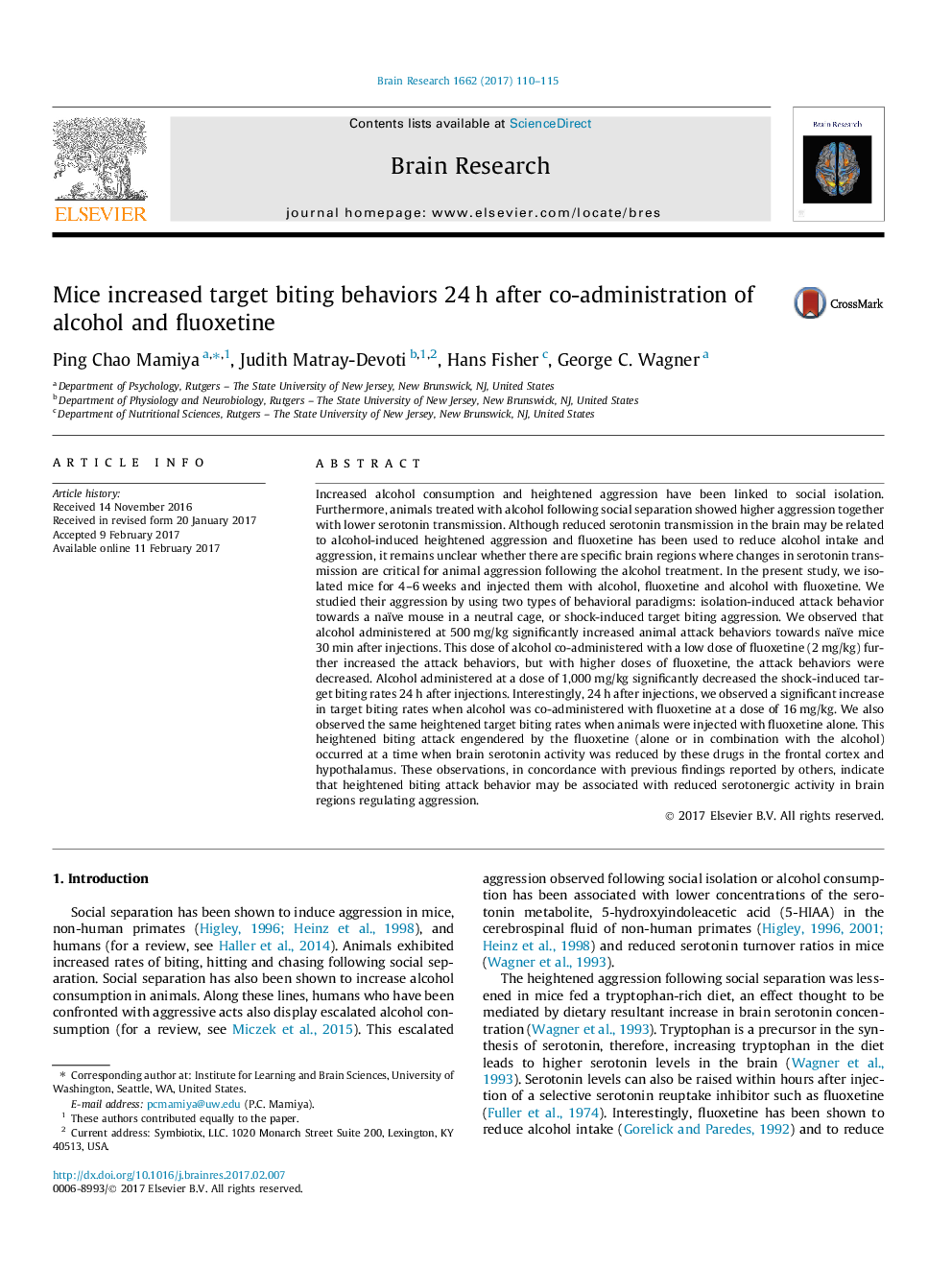| کد مقاله | کد نشریه | سال انتشار | مقاله انگلیسی | نسخه تمام متن |
|---|---|---|---|---|
| 5736770 | 1613783 | 2017 | 6 صفحه PDF | دانلود رایگان |
عنوان انگلیسی مقاله ISI
Mice increased target biting behaviors 24Â h after co-administration of alcohol and fluoxetine
ترجمه فارسی عنوان
موش ها رفتارهای کتک خوردن هدف را 24 ساعت و 24 ساعت پس از مصرف همزمان الکل و فلوکستین افزایش دادند
دانلود مقاله + سفارش ترجمه
دانلود مقاله ISI انگلیسی
رایگان برای ایرانیان
موضوعات مرتبط
علوم زیستی و بیوفناوری
علم عصب شناسی
علوم اعصاب (عمومی)
چکیده انگلیسی
Increased alcohol consumption and heightened aggression have been linked to social isolation. Furthermore, animals treated with alcohol following social separation showed higher aggression together with lower serotonin transmission. Although reduced serotonin transmission in the brain may be related to alcohol-induced heightened aggression and fluoxetine has been used to reduce alcohol intake and aggression, it remains unclear whether there are specific brain regions where changes in serotonin transmission are critical for animal aggression following the alcohol treatment. In the present study, we isolated mice for 4-6Â weeks and injected them with alcohol, fluoxetine and alcohol with fluoxetine. We studied their aggression by using two types of behavioral paradigms: isolation-induced attack behavior towards a naïve mouse in a neutral cage, or shock-induced target biting aggression. We observed that alcohol administered at 500Â mg/kg significantly increased animal attack behaviors towards naïve mice 30Â min after injections. This dose of alcohol co-administered with a low dose of fluoxetine (2Â mg/kg) further increased the attack behaviors, but with higher doses of fluoxetine, the attack behaviors were decreased. Alcohol administered at a dose of 1,000Â mg/kg significantly decreased the shock-induced target biting rates 24Â h after injections. Interestingly, 24Â h after injections, we observed a significant increase in target biting rates when alcohol was co-administered with fluoxetine at a dose of 16Â mg/kg. We also observed the same heightened target biting rates when animals were injected with fluoxetine alone. This heightened biting attack engendered by the fluoxetine (alone or in combination with the alcohol) occurred at a time when brain serotonin activity was reduced by these drugs in the frontal cortex and hypothalamus. These observations, in concordance with previous findings reported by others, indicate that heightened biting attack behavior may be associated with reduced serotonergic activity in brain regions regulating aggression.
ناشر
Database: Elsevier - ScienceDirect (ساینس دایرکت)
Journal: Brain Research - Volume 1662, 1 May 2017, Pages 110-115
Journal: Brain Research - Volume 1662, 1 May 2017, Pages 110-115
نویسندگان
Ping Chao Mamiya, Judith Matray-Devoti, Hans Fisher, George C. Wagner,
